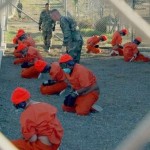Sunday
May232010
Afghanistan: Obama Suspends the Rule of Law (Greenwald)
 Sunday, May 23, 2010 at 13:18
Sunday, May 23, 2010 at 13:18  Glenn Greenwald writes in Salon:
Glenn Greenwald writes in Salon:Few issues highlight Barack Obama's extreme hypocrisy the way that Bagram [the US detention facility in Afghanistan] does. As everyone knows, one of George Bush’s most extreme policies was abducting people from all over the world -- far away from any battlefield -- and then detaining them at Guantanamo with no legal rights of any kind, not even the most minimal right to a habeas review in a federal court.
Back in the day, this was called "Bush's legal black hole." In 2006, Congress codified that policy by enacting the Military Commissions Act, but in 2008, the Supreme Court, in Boumediene v. Bush, ruled that provision unconstitutional, holding that the Constitution grants habeas corpus rights even to foreign nationals held at Guantanamo. Since then, detainees have won 35 out of 48 habeas hearings brought pursuant to Boumediene, on the ground that there was insufficient evidence to justify their detention.
Afghanistan and Beyond: The Wicked Ideology of Counter-Insurgency (Mull)
Immediately following Boumediene, the Bush administration argued that the decision was inapplicable to detainees at Bagram --- including even those detained outside of Afghanistan but then flown to Afghanistan to be imprisoned. Amazingly, the Bush DOJ [Justice Department] --- in a lawsuit brought by Bagram detainees seeking habeas review of their detention --- contended that if they abduct someone and ship them to Guantanamo, then that person (under Boumediene) has the right to a habeas hearing, but if they instead ship them to Bagram, then the detainee has no rights of any kind. In other words, the detainee's Constitutional rights depends on where the Government decides to drop them off to be encaged.
One of the first acts undertaken by the Obama DOJ that actually shocked civil libertarians was when, last February, as The New York Times put it, Obama lawyers "told a federal judge that military detainees in Afghanistan have no legal right to challenge their imprisonment there, embraci.ng a key argument of former President Bush’s legal team"
But last April, John Bates, the Bush-43-appointed, right-wing judge overseeing the case, rejected the Bush/Obama position and held thatBoumediene applies to detainees picked up outside of Afghanistan and then shipped to Bagram. I reviewed that ruling, in which Judge Bates explained that the Bagram detainees are "virtually identical to the detainees in Boumediene," and that the Constitutional issue was exactly the same: namely, "the concern that the President could move detainees physically beyond the reach of the Constitution and detain them indefinitely".
But the Obama administration was undeterred by this loss. They quickly appealed Judge Bates' ruling. As the New York Times described that appeal: "The decision signaled that the administration was not backing down in its effort to maintain the power to imprison terrorism suspects for extended periods without judicial oversight."
Today, a three-judge panel of the D.C. Circuit Court of Appeals adopted the Bush/Obama position, holding that even detainees abducted outside of Afghanistan and then shipped to Bagram have no right to contest the legitimacy of their detention in a U.S. federal court, because Boumediene does not apply to prisons located within war zones (such as Afghanistan).
So congratulations to the United States and Barack Obama for winning the power to abduct people anywhere in the world and then imprison them for as long as they want with no judicial review of any kind. When the Boumediene decision was issued in the middle of the 2008 presidential campaign, John McCain called it "one of the worst decisions in the history of this country." But Obama hailed it as "a rejection of the Bush Administration's attempt to create a legal black hole at Guantanamo," and he praised the Court for "rejecting a false choice between fighting terrorism and respecting habeas corpus". Even worse, when Obama went to the Senate floor in September, 2006, to speak against the habeas-denying provisions of the Military Commissions Act, this is what he melodramatically intoned:
As a parent, I can also imagine the terror I would feel if one of my family members were rounded up in the middle of the night and sent to Guantanamo without even getting one chance to ask why they were being held and being able to prove their innocence....
By giving suspects a chance --- even one chance --- to challenge the terms of their detention in court, to have a judge confirm that the Government has detained the right person for the right suspicions, we could solve this problem without harming our efforts in the war on terror one bit....
Most of us have been willing to make some sacrifices because we know that, in the end, it helps to make us safer. But restricting somebody's right to challenge their imprisonment indefinitely is not going to make us safer. In fact, recent evidence shows it is probably making us less safe.
Can you smell the hypocrisy? How could anyone miss its pungent, suffocating odor? Apparently, what Obama called "a legal black hole at Guantanamo" is a heinous injustice, but "a legal black hole at Bagram" is the Embodiment of Hope. And evidently, Obama would only feel "terror" if his child were abducted and taken to Guantanamo and imprisoned "without even getting one chance to ask why and prove their innocence".
But if the very same child were instead taken to Bagram and treated exactly the same way, that would be called Justice -- -or, to use his jargon, Pragmatism. And what kind of person hails a Supreme Court decision as "protecting our core values" --- as Obama said of Boumediene --- only to then turn around and make a complete mockery of that ruling by insisting that the Cherished, Sacred Rights it recognized are purely a function of where the President orders a detainee-carrying military plane to land?
Independently, what happened to Obama's eloquent insistence that "restricting somebody's right to challenge their imprisonment indefinitely is not going to make us safer; in fact, recent evidence shows it is probably making us less safe"? How does our policy of invading Afghanistan and then putting people at Bagram with no charges of any kind dispose people in that country, and the broader Muslim world, to the United States? If a country invaded the U.S. and set up prisons where Americans from around the world where detained indefinitely and denied all rights to have their detention reviewed, how would it dispose you to the country which was doing that?
One other point: this decision is likely to be appealed to the Supreme Court, which serves to further highlight how important the [Elena] Kagan-for-[John Paul] Stevens replacement could be. If the Court were to accept the appeal, Kagan would be required to recuse herself (since it was her Solicitor General's office that argued the administration's position here), which means that a 4-4 ruling would be likely, thus leaving this appellate decision undisturbed. More broadly, though, if Kagan were as sympathetic to Obama's executive power claims as her colleagues in the Obama administration are, then her confirmation could easily convert decisions on these types of questions from a 5-4 victory (which is whatBoumediene was, with Stevens in the majority) into a 5-4 defeat. Maybe we should try to find out what her views are before putting her on that Court for the next 40 years?
This is what Barack Obama has done to the habeas clause of the Constitution: if you are in Thailand (as one of the petitioners in this case was) and the U.S. abducts you and flies you to Guantanamo, then you have the right to have a federal court determine if there is sufficient evidence to hold you. If, however, President Obama orders that you be taken to from Thailand to Bagram rather than to Guantanamo, then you will have no rights of any kind, and he can order you detained there indefinitely without any right to a habeas review. That type of change is so very inspiring --- almost an exact replica of his vow to close Guantanamo...all in order to move its core attributes (including indefinite detention) a few thousand miles north to Thompson, Illinois.
Real estate agents have long emphasized "location, location, location" as the all-determining market factor. Before we elected this Constitutional Scholar as Commander-in-Chief, who knew that this platitude also shaped our entire Constitution?
UPDATE: Law Professor Steve Vladeck has more on the ruling, including "the perverse incentive that today's decision supports," as predicted by Justice [Antonin] Scalia in his Boumediene dissent: namely, that a President attempting to deny Constitutional rights to detainees can simply transfer them to a "war zone" instead of to Guantanamo and then claim that courts cannot interfere in the detention. Barack Obama quickly adopted that tactic for rendering the rights in Boumediene moot --- the same rights which, less than two years ago, he was praising the Supreme Court for safeguarding and lambasting the Bush administration for denying. Vladeck also explains why the appellate court's caveat -- that overt government manipulation to evade habeas rights (i.e., shipping them to a war zone with the specific intent of avoidingBoumediene) might alter the calculus -- is rather meaningless.
UPDATE II: Guest-hosting for Rachel Maddow last night, Chris Hayes talked with Shayana Kadidal of the Center for Constitutional Rights about the Bagram ruling and Obama's hypocrisy on these issues, and it was quite good, including a video clip of the 2006 Obama speech I excerpted above:
Visit msnbc.com for breaking news, world news, and news about the economy
And in The New York Times, Charlie Savage has a typically thorough examination of the impact of the ruling. As he writes: "The decision was a broad victory for the Obama administration in its efforts to hold terrorism suspects overseas for indefinite periods without judicial oversight." But GOP Sen. Lindsey Graham (author of the habeas-denying provision in the Military Commissions Act) "called the ruling a 'big win' and praised the administration for appealing the lower court’s ruling", and that's what really matters.
tagged  Antonin Scalia,
Antonin Scalia,  Barack Obama,
Barack Obama,  Boumediene v. Bush,
Boumediene v. Bush,  Camp Bagram,
Camp Bagram,  Center for Constitutional Rights,
Center for Constitutional Rights,  Charlie Savage,
Charlie Savage,  Chris Hayes,
Chris Hayes,  Elena Kagan,
Elena Kagan,  George W Bush,
George W Bush,  Glenn Greenwald,
Glenn Greenwald,  Guantanamo Bay,
Guantanamo Bay,  John Bates,
John Bates,  John McCain,
John McCain,  John Paul Stevens,
John Paul Stevens,  Lindsey Graham,
Lindsey Graham,  Military Commissions Act,
Military Commissions Act,  New York Times,
New York Times,  Rachel Maddow,
Rachel Maddow,  Salon,
Salon,  Shayana Kadidal,
Shayana Kadidal,  Steve Vladeck in
Steve Vladeck in  Afghanistan,
Afghanistan,  War On Terror
War On Terror
 Antonin Scalia,
Antonin Scalia,  Barack Obama,
Barack Obama,  Boumediene v. Bush,
Boumediene v. Bush,  Camp Bagram,
Camp Bagram,  Center for Constitutional Rights,
Center for Constitutional Rights,  Charlie Savage,
Charlie Savage,  Chris Hayes,
Chris Hayes,  Elena Kagan,
Elena Kagan,  George W Bush,
George W Bush,  Glenn Greenwald,
Glenn Greenwald,  Guantanamo Bay,
Guantanamo Bay,  John Bates,
John Bates,  John McCain,
John McCain,  John Paul Stevens,
John Paul Stevens,  Lindsey Graham,
Lindsey Graham,  Military Commissions Act,
Military Commissions Act,  New York Times,
New York Times,  Rachel Maddow,
Rachel Maddow,  Salon,
Salon,  Shayana Kadidal,
Shayana Kadidal,  Steve Vladeck in
Steve Vladeck in  Afghanistan,
Afghanistan,  War On Terror
War On Terror 




